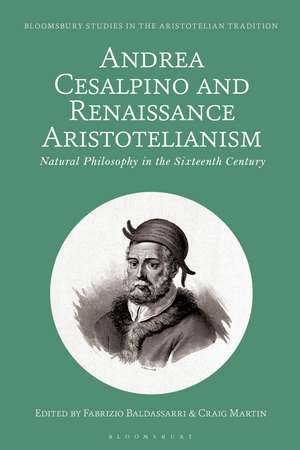Andrea Cesalpino and Renaissance Aristotelianism: Natural Philosophy in the Sixteenth Century: Bloomsbury Studies in the Aristotelian Tradition
Editat de Fabrizio Baldassarri, Craig Martinen Limba Engleză Hardback – 4 oct 2023
Din seria Bloomsbury Studies in the Aristotelian Tradition
- 20%
 Preț: 219.57 lei
Preț: 219.57 lei -
 Preț: 193.36 lei
Preț: 193.36 lei - 23%
 Preț: 191.22 lei
Preț: 191.22 lei - 23%
 Preț: 191.31 lei
Preț: 191.31 lei - 14%
 Preț: 512.22 lei
Preț: 512.22 lei - 30%
 Preț: 511.48 lei
Preț: 511.48 lei - 22%
 Preț: 236.45 lei
Preț: 236.45 lei - 22%
 Preț: 239.85 lei
Preț: 239.85 lei - 22%
 Preț: 230.51 lei
Preț: 230.51 lei - 13%
 Preț: 222.55 lei
Preț: 222.55 lei - 21%
 Preț: 216.99 lei
Preț: 216.99 lei - 23%
 Preț: 199.10 lei
Preț: 199.10 lei - 23%
 Preț: 198.12 lei
Preț: 198.12 lei - 23%
 Preț: 198.57 lei
Preț: 198.57 lei - 30%
 Preț: 510.42 lei
Preț: 510.42 lei - 30%
 Preț: 510.49 lei
Preț: 510.49 lei - 30%
 Preț: 511.48 lei
Preț: 511.48 lei -
 Preț: 250.59 lei
Preț: 250.59 lei
Preț: 511.14 lei
Preț vechi: 731.63 lei
-30% Nou
Puncte Express: 767
Preț estimativ în valută:
97.80€ • 102.13$ • 80.76£
97.80€ • 102.13$ • 80.76£
Carte tipărită la comandă
Livrare economică 15-29 aprilie
Preluare comenzi: 021 569.72.76
Specificații
ISBN-13: 9781350325142
ISBN-10: 1350325147
Pagini: 264
Dimensiuni: 156 x 234 mm
Greutate: 0.54 kg
Editura: Bloomsbury Publishing
Colecția Bloomsbury Academic
Seria Bloomsbury Studies in the Aristotelian Tradition
Locul publicării:London, United Kingdom
ISBN-10: 1350325147
Pagini: 264
Dimensiuni: 156 x 234 mm
Greutate: 0.54 kg
Editura: Bloomsbury Publishing
Colecția Bloomsbury Academic
Seria Bloomsbury Studies in the Aristotelian Tradition
Locul publicării:London, United Kingdom
Caracteristici
Draws together Cesalpino's role in key events such as modern botany, the Galileian revolution, and the physiological understanding of blood circulation
Notă biografică
Fabrizio Baldassarri is Marie Sklodowska Curie Fellow at Ca' Foscari University of Venice, Italy. Craig Martin is Associate Professor of History of Science and Technology at Ca' Foscari University of Venice, Italy.
Cuprins
Andrea Cesalpino. An Introduction, Fabrizio Baldassarri (University of Venice, Italy) and Craig Martin (University of Venice, Italy)Part I. Philosophy1. Andrea Cesalpino's Epistemology, Marco Sgarbi (Ca' Foscari, Venice, Italy)2. Philosophy, Medicine and Humanism in Cesalpino's Investigation into Demons, Craig Martin (University of Venice, Italy)3. Plato and Andrea Cesalpino's Aristotelianism: A Revealing Marginality, Eva del Soldato (University of Pennsylvania, USA) 4. Cesalpino on Sensitive Powers and the Question of Divine Immanence, Andreas Blank (Klagenfurt University, Austria)5. Andrea Cesalpino and the Rejection of the Celestial Spheres in Seventeenth-Century University of Edinburgh, David McOmish (Ca' Foscari Venice, Italy)Part II. Natural Philosophy 6. Cesalpino's (Aristotelian) Philosophy of Plants: A Science of Botany in the Renaissance, Fabrizio Baldassarri (University of Venice, Italy)7. Aristotelian Metaphysics of the Vegetative Soul and Early Modern Plant Physiology: Comparison between Plant Functions in Aristotle, Pseudo-Aristotle, and Cesalpino, Corentin Tresnie and Quentin Hiernaux (both FNRS University of Brussels, Belgium) 8. Paratextual Debates in De plantis (1583): On the best Form of Botanical Prose, Garden and Things, and the Author-Figure of Cesalpino, Julia Heideklang (Humboldt University, Berlin, Germany) 9. Cesalpino's Mineralogy between Meteorology and Chymistry, Hiro Hirai (Columbia University, USA)Part III. Medicine10. Anatomy and Practice: Andrea Cesalpino's Praxis universae artis medicae, R. Allen Shotwell (Ivy Tech Community College, USA) 11. Simple and Compound Drugs in Late Renaissance Medicine: The Pharmacology of Andrea Cesalpino (1593), Elisabeth Moreau (Université Libre de Bruxelles, Belgium) 12. Cesalpino's Theory of Disease between Galenism and Renaissance Neoplatonism: De morbo gallico in Context, Carmen Schmechel (Freie University of Berlin, Germany)Index
Recenzii
This volume provides an engaging series of studies that set Andrea Cesalpino's philosophical and medical writings within the context of sixteenth-century thought. They show that his allegiance to Aristotelian assumptions did not prevent him from pursuing new lines of enquiry and coming to different solutions.
Philosopher and physician, botanist and naturalist, Andrea Cesalpino engaged in many of the most contentious natural philosophical debates of the sixteenth century. The contributors to this volume unravel his complex strands of thought, draw connections within and across his works, and reveal Cesalpino's centrality to early modern intellectual history.
Philosopher and physician, botanist and naturalist, Andrea Cesalpino engaged in many of the most contentious natural philosophical debates of the sixteenth century. The contributors to this volume unravel his complex strands of thought, draw connections within and across his works, and reveal Cesalpino's centrality to early modern intellectual history.
